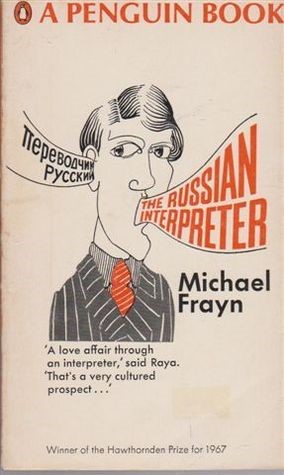
Michael Frayn — man of letters, leading British playwright, acclaimed novelist; also a renowned translator of Chekhov and, less well known, of ‘the Soviet Chekhov’ Yurii Trifonov.
Published in 1966, The Russian Interpreter came at the outset of Frayn’s literary career. His second novel, it appeared in the year that his first novel, The Tin Men, won the Somerset Maugham Award. Unusually for a writer from the West in that era, Frayn was able to draw on significant experience of living in the Soviet Union.
The Russian Interpreter is set in Moscow in the late 1950s as the thaw of the Khrushchev years opens up the Soviet capital following decades of Stalinist totalitarianism. The temporal setting is important plot-wise. The story revolves around two Englishmen, who stumble their confused way through the rather surreal world —to Western eyes at least— of a system that has only just opened its doors to such visitors.
Manning (and this was an age when ‘surnames only’ was the accepted mode of address amongst a certain class of Englishman) is a postgraduate student trying to complete his thesis in Moscow State University’s Faculty of Administrative-Management Sciences. Proctor-Gould is a visiting businessman of a rather imprecise type who makes himself known to Manning, and employs him as the interpreter of the title.
Frayn learned Russian whilst doing his National Service at the famous Joint Services School for Linguists, amongst whose alumni are fellow playwrights Alan Bennett and Dennis Potter.
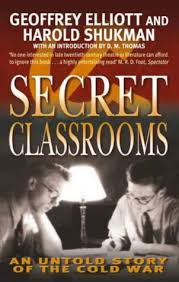
The story of this School is worth a read, in Geoffrey Elliott and Harold Shukman’s Secret Classrooms: An Untold Story of the Cold War (2003)
Frayn, like his character Manning, visited Moscow on an exchange visit whilst he was a student at Cambridge. As he told The Guardian nearly 50 years after that visit and 40 years after The Russian Interpreter was published:
When I wrote the book, in the mid-60s, the Soviet Union seemed proof against the mutability of things. “This place must change!” said my despairing Russian friends. “It can’t go on like this!” But it did. For year after year Moscow remained very much the same place that it was on my first visit, in 1956
…
It was another world. Empty monumental prospects in the centre, tumbledown wooden houses on the outskirts; vainglorious slogans and glistening spittoons; the intensely characteristic smells of low-octane petrol and frying pirozhki. In the woods to the west of the city there were still the remains of trenches and shattered steel helmets, where the German advance was finally halted in 1941; in the streets were legless veterans scooting along in little home-made trolleys.
…
I was a university student by this time, and I was in Moscow on what I think was the first ever student exchange, living for a month in the vast new university skyscraper, and commuting in by bus and tube every day to follow courses in the old university buildings opposite the Kremlin; unheard-of freedom for foreigners at the time.
‘Russian Hide and seek’, The guardian, 2 July 2005
The novel itself portrays its Moscow with the erudite precision that one would expect from a writer of Frayn’s calibre. The sense of empty space in the city centre seems extraordinary to anybody who knows contemporary Moscow, whilst ringing true to those of us who knew Soviet-era Moscow.
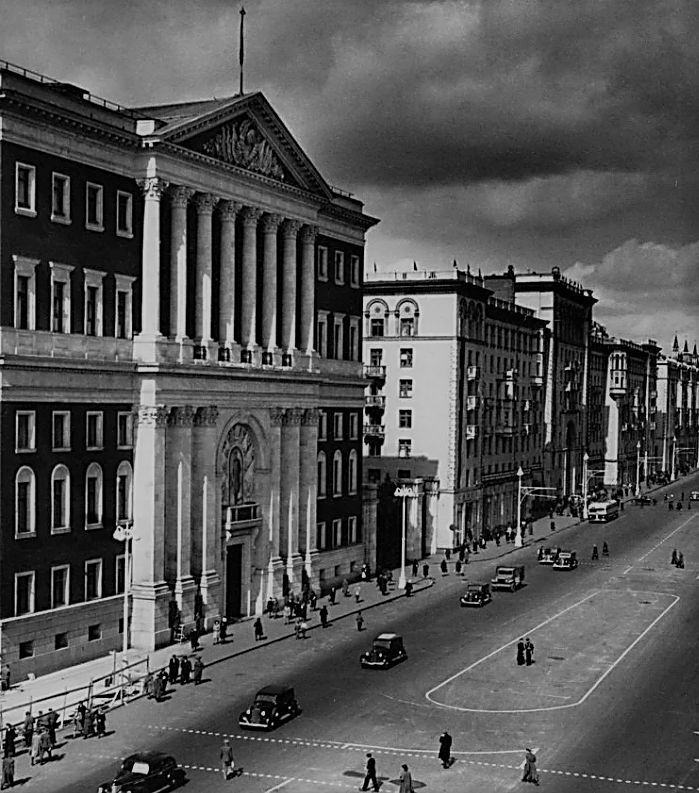
He crossed the great empty Plaza in front of the University, watched impassively by the gigantic gimcrack statues 30 floors above of women grasping hammers and cog-wheels. Everything seemed enormous and out-of-scale … Beyond the Plaza, in the formal vista of the ornamental gardens, solitary pedestrians moved like Bedouin, separated from one another by Saharas of empty brown flower-beds and drying tarmacadam. They were so small they seem to be merely an infestation.
the russian interpreter, p. 7
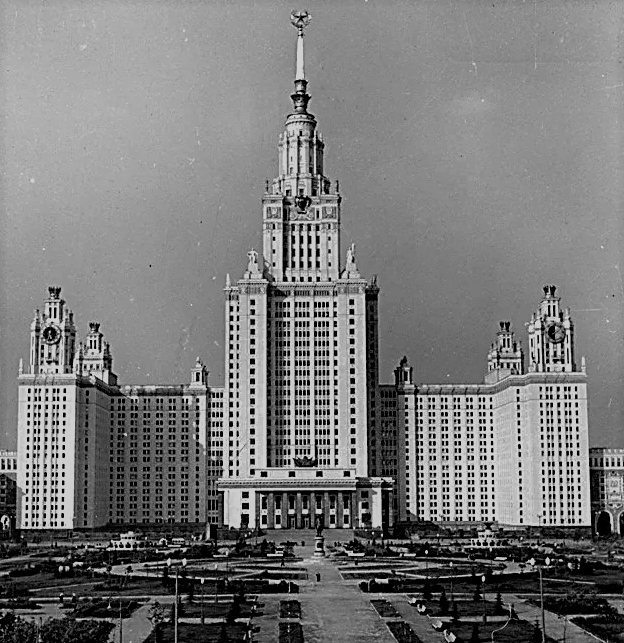
There are many other similarly well-drawn descriptions of familiar aspects of life for the visiting student in Soviet-era Moscow: descriptions of trudging the streets for hours deep in conversation with a trusted friend away from privacy-free and microphone-vulnerable halls of residence; an account of one of those inevitable group trips out into the countryside, replete with enthusiastic Party-sponsored organiser and forced jollity; and mention of the way that Finland, as the nearest and most accessible part of ‘the West’, soon came to represent to certain Westerners in Moscow some sort of Shangri-La to which they might temporarily retreat in order to buy scarce goods and regain some of their sanity.
The physical descriptions are matched by Frayn’s ability to go beyond them and portray various character types, and a sense of the somewhat surreal life lived in official Moscow, particularly so far as contact with the West and Westerners was concerned.
Everything in Moscow was like this — unnecessarily complicated, never more than half-explained. The simplest of life’s arrangements had to be heaved into place against the gravitational pull of indifference and muddle. There were always two left shoes, and one finger too many to go in the holes of the glove. He felt, as he often did, that he would like to lie down, exhausted.
the russian interpreter, p. 7
Amongst Manning’s acquaintances are readily identifiable figures. His friend Katya, cast out of official Soviet life because her religious philosophy doesn’t fit.
I just want to commit myself to those who have no such riches. That’s the real battle in life —the one between the strong and the weak … But I recognise my weakness, and I use it as my passport to where I want to be —in the ranks of the losers.
the russian interpreter, p. 24
Or Sasha, the reliable Party-friendly student who acts as minder to the English visitor. For the Soviet authorities, decisions as to who became the room- or office-mate of a visiting Westerner were too important to be left to mere chance.
And then there is Raya, the good-looking blonde, happy to move in with Proctor-Gould, but whose interests seem to be directed more at the possessions he has brought from the West —notably his ready supply of Nescafé— than at the man himself.

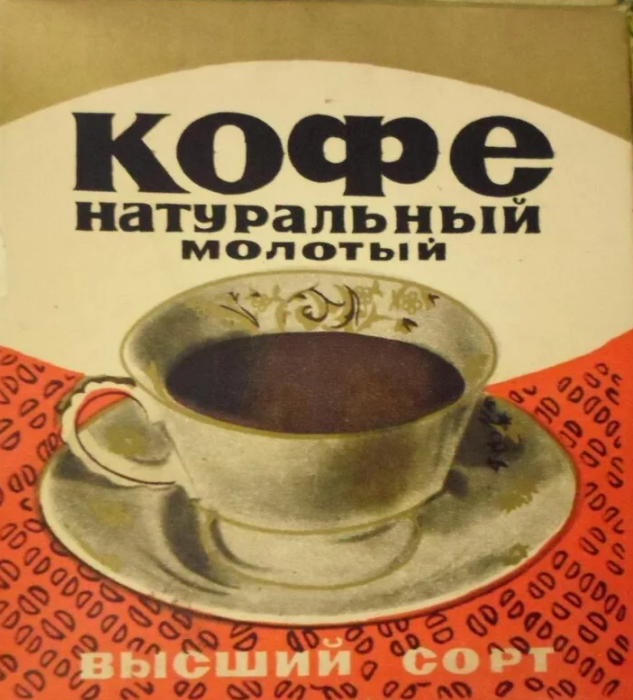
Much of what this review has covered so far relates to the first part of the book. As the plot progresses, it moves away from the ‘normal’ everyday life of its opening chapters and develops into something a little more engaged with hints of espionage, the security services, and criminality.
Fascinating though The Russian Interpreter is for its insights into the Moscow of those years, the novel reads now as very much of its time; a rather mannered work where the confusion felt by the characters matches a plot that does not so much develop as emerge from a series of expertly described, somewhat peculiar scenes.
That Proctor-Gould turns out to not quite be what he seems to be is somehow not surprising because from the off this seemed clear, even though quite what he seemed to be was itself not overly apparent.
Similarly, the Soviet characters who populate the second half of the book are given to eccentric behaviour that is likewise not what it seems to be whilst never quite seeming to be one thing in particular in the first place. The recurring oddness of situations, and the rushing around from place to place, put me in mind, in a subliminal half-remembered sort of way, of Nikolai Gogol’s Petersburg tales.
Confused? One must presume that this is a strength of the novel. From the beginning Frayn establishes that Manning finds the whole Soviet experience bemusing and rather unfathomable, and so the unfolding of the plot sits well within this frame.
By the final pages, Manning and Proctor-Gould are on a return flight to London together. In those days, passengers on such flights often had a sense, felt most strongly by those whose sojourn in the Soviet Union had been lengthy, that they were not just on a four-hour journey, but rather were engaged in a more elemental transference from one realm to another. It was standard for applause to break out when the pilot announced that the plane was leaving Soviet air space.
Manning and Proctor-Gould are, as through the rest of The Russian Interpreter, a little bewildered, and unable to work out quite what has happened during the time of their acquaintance. It is a feeling I shared when putting the novel down at its end.